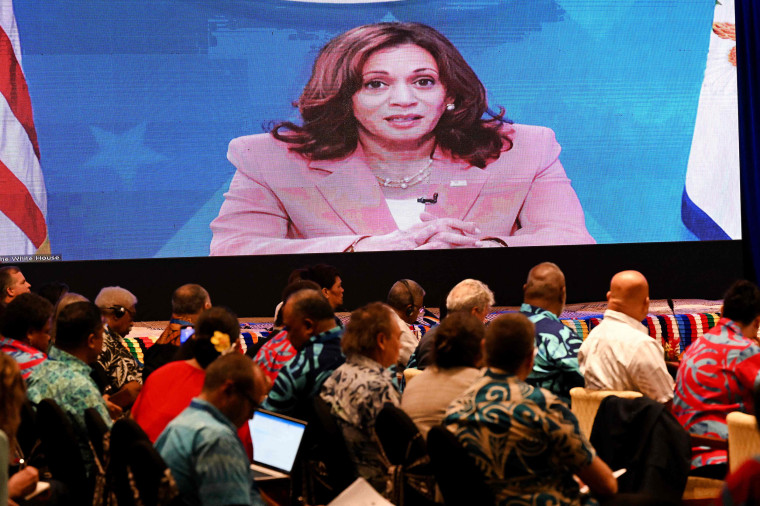CANBERRA, Australia — U.S. Vice President Kamala Harris announced new investments in the Pacific and the opening of two embassies on Wednesday in a speech to a summit of island nations that are increasingly coming under Chinese influence.
Harris’s invitation to speak virtually at the Pacific Islands Forum in Fiji was remarkable given that the forum’s dialogue partners — including the United States, China, Britain and France — had not been invited to this year’s summit.
Harris said the U.S. would establish two new embassies in Tonga and in Kiribati, a Micronesian state that split this week from the 18-nation forum in a major blow to regional harmony.
She also proposed requesting that Congress triple funding for economic development and “ocean resilience” in the region to $60 million a year, the return of Peace Corps volunteers to the region and the appointment of the first U.S. envoy to the forum.
“We recognize that in recent years, the Pacific Islands may not have received the diplomatic attention and support that you deserve,” Harris said. “So today I am here to tell you directly: We are going to change that.”
The United States and the forum’s wealthiest nations, Australia and New Zealand, are concerned about a security pact signed this year between China and the Solomon Islands and have responded by stepping up their engagement in the region. Last year, President Joe Biden became the first U.S. president to address the forum.
Earlier this year, the United States said it would reopen its embassy in the Solomon Islands for the first time since 1993. Secretary of State Antony Blinken made the announcement in February during a Pacific tour that was the first such trip by America’s top diplomat in four decades.

In 2019, both the Solomon Islands and Kiribati shifted their diplomatic recognition from self-ruling Taiwan to Beijing, which claims the island as its territory. Kiribati’s withdrawal from the forum is being interpreted as a deepening of China’s influence in the region.
Australian Foreign Minister Penny Wong on Tuesday urged forum nations to unite on their shared challenges, which include U.S.-China strategic competition, climate change and the coronavirus pandemic.
“All the nations are seeking to navigate those challenges. And we do it best when we can do it together,” Wong said.
New Zealand Prime Minister Jacinda Ardern, who arrived Monday in Fiji, described Kiribati’s withdrawal as “disappointing.” Wong said the “door remains open” to Kiribati returning.
The forum’s secretary general, Henry Puna, on Tuesday addressed “our brothers and sisters from Micronesia” and appealed for reconciliation.
“I acknowledge again the breakdown in our connections of the past two years,” said Puna, who is a former prime minister of the Cook Islands.
“My hope is that through our dialogue mechanism and the resolutions that we are working towards, you continue to find value and indeed belonging within the forum,” he added.
Puna was elected secretary general last year over a Micronesian candidate, deepening the rift between Kiribati and the other nations. Because of the pandemic, the Fiji summit is the Pacific leaders’ first opportunity for face-to-face meetings since 2019, when the forum met in Tuvalu.
In his opening address at the forum, which he is chairing as this year’s host, Fijian Prime Minister Frank Bainimarama said Pacific nations had a choice.
“The most important consideration for us this week is this: How will we, the Pacific Islands Forum, choose to navigate these challenges and opportunities as we voyage into the future?” he asked. “Will we forge ahead together? Will we take individual paths? Will we be assertive or will we leave it to others to decide our fate?”
In May, China fell short on a bold plan to have 10 Pacific nations endorse a sweeping new agreement covering everything from security to fisheries as some in the region expressed deep concerns. But there were plenty of smaller wins for Chinese Foreign Minister Wang Yi during his island-hopping tour of the region, including bilateral agreements.
Wang was in Fiji on May 30 to co-host a key meeting with the foreign ministers from the 10 island nations. At an unusual news conference afterward, Wang and Bainimarama spoke for about 30 minutes and then abruptly left the stage as reporters tried to shout out questions. That left many details of what transpired at the meeting unanswered, but it was clear the nations hadn’t endorsed China’s plan.